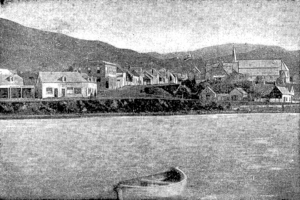Old St Paul's, Wellington facts for kids
Quick facts for kids Old St Paul's |
|
|---|---|

Main entrance to Old St Paul's
|
|
| 41°16′35″S 174°46′49″E / 41.276262°S 174.780394°E | |
| Country | New Zealand |
| Previous denomination | Anglican |
| History | |
| Status |
|
| Founded | 21 August 1865 |
| Founder(s) | Governor George Grey |
| Dedication | Paul the Apostle |
| Consecrated | 6 June 1866 by Bishop Charles Abraham |
| Architecture | |
| Functional status | Sold |
| Architect(s) | Rev'd Frederick Thatcher |
| Architectural type | Church |
| Style | Gothic Revival |
| Years built | 1865–1866 |
Old St Paul's is a very old and special building in Wellington, the capital city of New Zealand. It's a famous landmark and a popular place for weddings and other events.
For many years, from 1866 to 1964, it was an important church for the Anglican Church. It was both a local church for the Thorndon area and a "pro-cathedral," which means a temporary main church for the Diocese of Wellington.
This building is a great example of 19th-century Gothic Revival architecture. This style looks like old European churches, but Old St Paul's was built using local New Zealand wood. You can find it at 34 Mulgrave Street, very close to the Parliament Buildings.
Contents
History of Old St Paul's
The land where Old St Paul's stands was bought in parts. George Selwyn, the first Bishop of New Zealand, bought some of it in 1845. Later, in 1853, Governor George Grey added more land. Back then, the land was on a high cliff overlooking Wellington harbour.
People decided to build the church in 1861. The Reverend Frederick Thatcher, who was the vicar (a type of priest) of St Paul's, Thorndon, became the architect. He designed the building.
Building the Church
Governor Grey laid the first stone for the church on August 21, 1865. John McLaggan and a team of eight carpenters built the church. It was officially opened and blessed by Bishop Abraham on June 6, 1866.
Soon after it opened, people noticed the church wasn't very stable in strong winds. So, in 1868, a part called the south transept was added. This part was designed by Christian Julius Toxward.
More parts were added later to make the church bigger and stronger:
- The north transept and an extension to the north aisle were added in 1874, also by Toxward.
- The chancel (the area around the altar) was moved five metres to the east in 1876.
- A choir vestry (a room for the choir) was added in 1882.
- The baptistry (where baptisms happen) was extended in 1891.
The original roof was made of wooden shingles, but it was changed to corrugated iron in 1895. Then, in 1924, it was replaced again with Welsh slates.
Saving Old St Paul's
In 1964, the main church for the Diocese of Wellington moved to a new building nearby called St Paul's Cathedral. There was a big discussion about whether to tear down Old St Paul's. Luckily, many people fought to save it.
In 1967, the New Zealand Government bought the building. The Ministry of Works then carefully fixed it up, guided by Peter Sheppard.
Architecture and Design
Old St Paul's is built in the Gothic Revival style. This style tries to copy the look of grand medieval churches, but Old St Paul's has a simpler feel because of the materials available at the time.
The church is built using beautiful New Zealand native timbers. Inside, it has amazing stained-glass windows that let colorful light stream in. The inside roof looks like the bottom of an old wooden ship turned upside down. You can see the curved rimu wood beams and kauri wood lining the roof.
Photo gallery
Old St Paul's Today
Today, Old St Paul's is a very important historic place, listed as a Category 1 Historic Place. It is now looked after by Heritage New Zealand Pouhere Taonga.
Even though it's not a regular church anymore, it is still a sacred place. It's a very popular spot for weddings, funerals, and other special events. In 2016, a special service was held there to celebrate 150 years since it was first blessed.
Inside the main part of the church, called the nave, you can see flags displayed. These include flags from the Royal Navy, the New Zealand Merchant Navy, and the United States Marine Corps. The U.S. Marines were stationed in Wellington during World War II. Old St Paul's still has strong connections with the New Zealand Defence Force.
Many walls and columns inside Old St Paul's have special plaques. These plaques remember people, including many who fought and died in World War I. There's also a plaque for John Beaglehole, a historian from Wellington. He was famous for writing about explorer James Cook, but he also played a big part in saving Old St Paul's from being torn down.
Old St Paul's was closed for a while from May 2019 to July 2020. During this time, it was made stronger to protect it from earthquakes. This process is called seismic strengthening.
 | Roy Wilkins |
 | John Lewis |
 | Linda Carol Brown |





